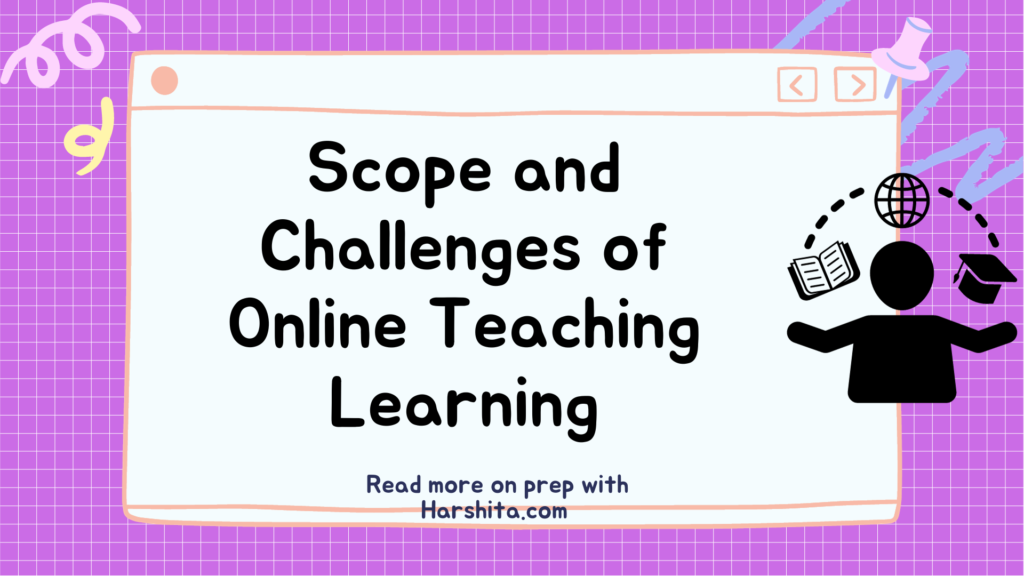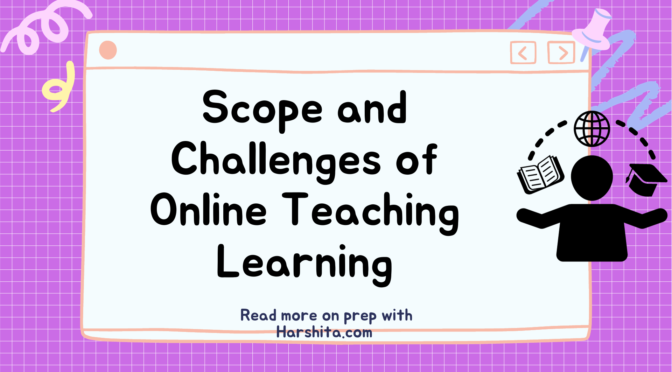Online teaching and learning have become increasingly prominent in the education sector, especially with the advent of digital technology and the Internet. However, they come with their own scope and challenges:
Scope of Online Teaching and Learning:
- Global Reach: Online teaching enables educators to reach a global audience, breaking down geographical barriers. Students from around the world can access quality education without having to relocate.
- Flexible Learning: Online education offers flexibility in terms of when and where students can learn. It caters to a wide range of learners, including those who are working or have other commitments.
- Diverse Learning Resources: With the internet at their disposal, students can access a vast array of learning resources, including videos, interactive simulations, e-books, and more.
- Personalized Learning: Many online platforms and tools allow for personalized learning experiences. Students can progress at their own pace and receive customized feedback and resources.
- Cost-Efficiency: Online education can often be more cost-effective than traditional classroom-based education. It eliminates the need for physical infrastructure and reduces other operational costs.
- Accessibility: Online education can be more accessible for students with disabilities, as it allows for the integration of assistive technologies.
Challenges of Online Teaching and Learning:
- Technical Challenges: Many students and educators may not have access to reliable internet connections and suitable devices, which can hinder the online learning experience.
- Engagement and Motivation: It can be challenging to keep students engaged and motivated in an online environment, as there are more distractions and less face-to-face interaction.
- Lack of Social Interaction: Online learning can be isolating, as it often lacks the social aspects of traditional classroom learning. This can impact students’ social and emotional development.
- Assessment and Cheating: Assessing students’ learning and preventing cheating can be more challenging in an online setting. Proctoring and plagiarism detection tools are often used to address this issue.
- Teacher Training: Educators need to be trained in online teaching methods and tools. Many traditional educators may lack the necessary skills and experience.
- Quality Assurance: Ensuring the quality of online courses and programs can be a challenge. It’s essential to have mechanisms in place to evaluate and improve the quality of online education.
- Data Privacy and Security: Protecting students’ personal information and ensuring the security of online learning platforms is crucial. Data breaches and privacy concerns can be significant issues.
- Inequity and Accessibility: Online education may exacerbate existing inequalities, as not all students have equal access to technology and a conducive learning environment.
- Regulatory and Accreditation Challenges: Some online education providers face challenges in obtaining accreditation and recognition, which can impact the value of the credentials they offer.
- Content Quality: The quality of online educational content can vary widely. Ensuring that the content is accurate, up-to-date, and effective is a continuous challenge.
Also Read: Infusion of ICT in Lesson Planning

Also Visit: Prep with Harshita


Your point of view caught my eye and was very interesting. Thanks. I have a question for you.